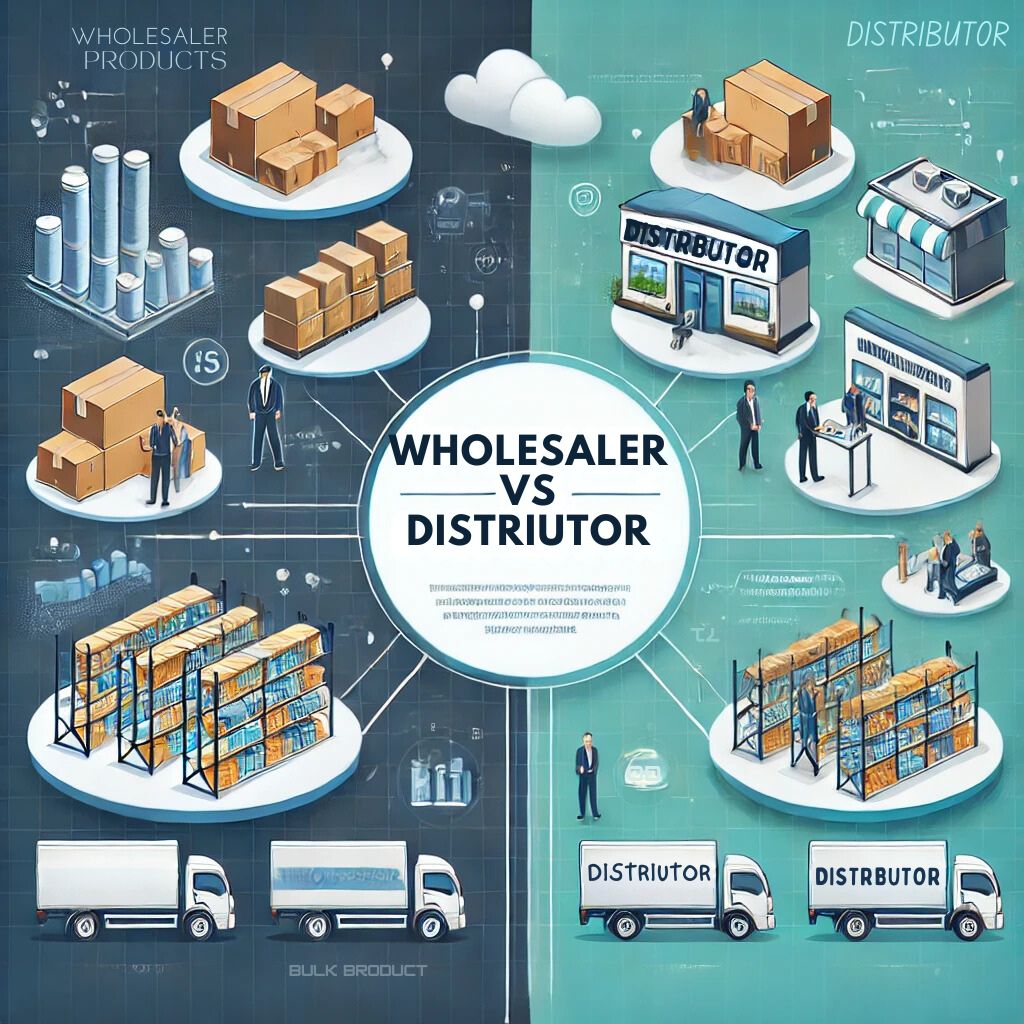Wholesalers vs distributors are usually compared in the supply chain and distribution network. They help in moving goods from manufacturers to retailers, but they play different roles and have different responsibilities. A wholesaler buys goods in a large quantity from the manufacturer and sells them to retailers in smaller quantities. The distributor directly deals with the manufacturer to sell and promote its products to retailers or end-users. Businesses should, therefore, understand the difference between the two intermediaries and choose the appropriate intermediary that suits their supply chain.
What is Wholesaler?
A wholesaler is a business or individual that purchases goods in large quantities from manufacturers and sells them in smaller quantities to retailers, other wholesalers, or sometimes directly to consumers. Wholesalers act as intermediaries in the distribution chain, focusing on bulk transactions. They typically do not engage in promoting or marketing the products they sell, but they provide the necessary storage, logistics, and delivery services to retailers.
Key Features of Wholesalers
The features of a wholesaler emphasize the intermediary nature of their role in the supply chain. Wholesalers provide essential functions, especially in terms of handling bulk goods, storage, and distribution.
- Bulk Purchases: Wholesalers buy large quantities of goods directly from manufacturers at a lower price.
- Sell in Smaller Quantities: They break down bulk products into smaller units for resale to retailers or other buyers.
- Minimal Marketing: Wholesalers do not typically engage in promotional activities but focus on ensuring the products are available for resale.
- Storage and Logistics: They often provide storage facilities and manage the distribution of products.
- Limited Customer Interaction: They rarely interact with the end consumer and focus mainly on B2B (business-to-business) sales.
What is Distributor?
A distributor is a business or individual who acts as a middleman between the manufacturer and the retailer but with more active involvement in marketing and promoting the product. Distributors often have exclusive rights to sell certain products within specific territories. Unlike wholesalers, distributors maintain a close relationship with the manufacturer to ensure that products are available in the market, and they often provide after-sales support, training, and promotion.
Key Features of Distributors
The features of a distributor highlight their active role in promoting products, maintaining stock, and providing support to both manufacturers and customers. They are more involved in the sales process and have a larger role in ensuring the success of the product in the market.
- Exclusive Rights: Distributors are often given exclusive rights to sell certain products in a specific geographic area.
- Active Marketing: They promote and advertise the products, sometimes even handling the brand’s marketing strategy.
- Customer Support: Distributors provide after-sales support, warranty management, and customer service, ensuring that end users are satisfied.
- Partnership with Manufacturers: They work closely with manufacturers to maintain stock levels and meet market demands.
Key Differences Between Wholesaler & Distributor
Wholesalers vs distributors, Both serve as intermediaries in the supply chain, their roles, responsibilities, and relationships with manufacturers and retailers are quite different. Here are the 5 differences between wholesaler & distributor:

Role in Supply Chain
- Wholesaler: Wholesalers sell bulk products to retailers or other wholesalers. They focus on buying large amounts of goods from manufacturers and reselling them to other businesses. Their main job is to move products from one business to another.
- Distributor: Distributors, however, do more than just sell products. They also market and promote products to retailers and consumers. Distributors work actively to increase sales by getting the products into the hands of the people who need them.
Relationship with Manufacturer
- Wholesaler: Wholesalers have a limited relationship with manufacturers. They mainly buy products in bulk but don’t usually work closely with the manufacturers. Their role is mainly about buying large quantities at good prices and selling them.
- Distributor: Distributors, on the other hand, have a closer relationship with manufacturers. They often work exclusively with certain manufacturers, helping them with marketing, product promotion, and even reaching new customers. Distributors and manufacturers often build long-term partnerships to help grow the business.
Marketing Activities
- Wholesaler: Wholesalers do little to market the products they sell. Their focus is on moving large quantities of goods from one business to another, not on advertising or promoting the products.
- Distributor: Distributors, however, are very active in marketing. They run advertising campaigns, organize promotions, and try to get the product in front of as many customers as possible. Distributors work hard to increase product visibility and attract more sales.
Territorial Rights
- Wholesaler: Wholesalers don’t have exclusive rights to sell products in specific areas. They can sell to any retailer, anywhere. They usually operate in a broad market without restrictions on where they can sell.
- Distributor: Distributors, on the other hand, often have exclusive rights to sell products in certain areas or regions. This means that they focus on a specific territory and work to grow the product’s presence within that region. Exclusivity helps them concentrate their efforts on that market.
Customer Service
- Wholesaler: Wholesalers do not provide customer service. Their role is focused on selling large quantities of products to businesses, not on handling customer concerns or providing after-sales support.
- Distributor: Distributors, however, take care of customer service. They offer support after a sale, manage returns, and handle warranties. Distributors are more involved in making sure customers are happy with the product and providing help when needed.
| Aspect | Wholesaler | Distributor |
| Role in Supply Chain | Sells bulk products to retailers or other wholesalers. | Actively markets and promotes products to retailers and consumers. |
| Relationship with Manufacturer | Limited involvement, mainly handles bulk buying. | Closer relationship, often works exclusively with manufacturers. |
| Marketing Activities | Minimal marketing efforts. | Actively involved in advertising and promotion of products. |
| Territorial Rights | No exclusive territory; sells to any retailer. | Often given exclusive rights to sell in a specific region. |
| Customer Service | Does not usually provide customer support. | Provides after-sales support, warranties, and customer service. |
Conclusion
While wholesalers focus on bulk purchasing and distribution, distributors take on a more active role, involving marketing, customer service, and building relationships with both manufacturers and retailers. Understanding the differences between these two intermediaries helps businesses choose the right partner based on their needs for logistics, promotion, and market reach. Wholesalers vs distributors are usually compared in the supply chain and distribution network.
Wholesaler vs Distributor FAQs
What Is the Difference Between Wholesaler and Distributor?
A wholesaler buys goods in bulk from manufacturers and sells them in smaller quantities to retailers. A distributor, however, works more closely with manufacturers to promote and sell products, often with exclusive rights.
What Is the Role of a Wholesaler?
A wholesaler buys large quantities of products from manufacturers and resells them in smaller quantities to retailers or other businesses. They focus on bulk transactions and logistics.
What Is the Role of a Distributor?
A distributor markets and promotes products, often with exclusive rights to sell in a specific region. They maintain stock, provide customer service, and support the product’s success in the market.
Which Is Better, a Wholesaler or a Distributor?
It depends on the needs of the business. If you need bulk goods for resale, a wholesaler is ideal. If you need help with marketing, customer support, and exclusive rights, a distributor may be better.
Can a Business Use Both a Wholesaler and a Distributor?
Yes, many businesses work with both wholesalers and distributors. A wholesaler helps with bulk purchasing and logistics. A distributor focuses on promotion, customer service, and expanding market reach.


